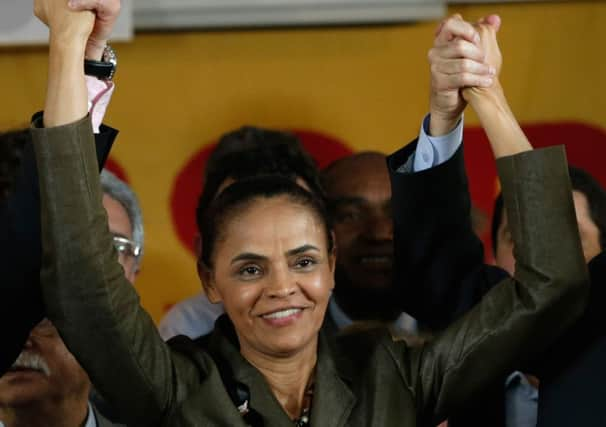Brazi election wide open as Socialists choose Silva


Ms Silva, who had been Eduardo Campos’ vice presidential running mate, met members of the party in the capital Brasilia who officially approved her as the new candidate.
The decision was widely expected. Party members and Ms Silva’s associates had said over the weekend that the main leaders had already chosen her to run in Mr Campos’s place.
Advertisement
Hide AdAdvertisement
Hide AdThe party also announced that Beto Albuquerque, who heads the party in the House of Representatives, will be Ms Silva’s running mate.
Polls had placed Mr Campos third behind president Dilma Rousseff, of the Workers Party, and the centrist candidate, Aécio Neves.
Since Mr Campos’ death, polls have shown Ms Silva is running neck and neck with Mr Neves.
Ms Silva, 56, was the environment minister from 2003-8 under Ms Rousseff’s predecessor, Luiz Inácio Lula da Silva. She won international praise for her work preserving the Amazon rainforest.
But she broke with the Workers Party in 2009 to join the Green Party, which she represented in the 2010 presidential election, winning nearly 20 per cent of the votes.
Political analysts say Ms Silva may be a stronger candidate than Mr Campos and could at least thwart a first-round victory for Ms Rousseff on 5 October.
Her main support comes from Brazilians unhappy with sluggish economic growth, high taxes and poor health care and education.
Ms Silva has pledged to build a more prosperous Brazil and slammed the performance of Ms Rousseff, who has overseen four years of lacklustre growth and high inflation in a previously booming economy.
Advertisement
Hide AdAdvertisement
Hide AdShe said: “We know that our country needs investments and they will come when there is a new government that has credibility among investors.”
Ms Silva reaffirmed her commitment to fiscal responsibility, inflation targeting and a floating exchange rate, the so-called “tripod” of economic policies that gave Brazil stability after a period of rampant inflation and erratic growth in the 1990s. Viewed as an outsider with no links to traditional elites, Ms Silva’s environmental and religious beliefs prompt critics to call her inflexible. Supporters, however, praise her as Brazil’s most principled politician.
She is expected to appeal mostly to young voters disgusted with Brazil’s political establishment.
Ms Silva is also embraced by Brazil’s large evangelical Christian community and has proven, in a 2010 bid for the presidency with the Green Party, to be an attractive candidate for independent voters seeking an alternative to the Workers’ Party and its main opposition, the business-friendly Brazilian Social Democracy Party (PSDB).
The vote is expected to go to a run-off in which Ms Silva, if she finishes ahead of Mr Neves, enjoys growing odds of defeating Ms Rousseff.
A PSDB source said the party, to ensure Ms Rousseff is unseated, would back Ms Silva in a run-off if Mr Neves failed to win enough votes.
Ms Silva’s prospects could fade when the emotional impact of Mr Campos’s death subsides and the two much-bigger parties begin heavy campaign spending.
When she was environment minister Ms Silva clashed with other officials, including Ms Rousseff, over the licensing of hydroelectric dams in the Amazon, ultimately leading her to resign.
Advertisement
Hide AdAdvertisement
Hide AdAs a Workers’ Party opponent in 2010, she reaped a stronger-than-expected 19 per cent of the vote.
For this candidacy to succeed, Ms Silva must broaden her base and draw funding from sectors of Brazilian society, particularly the business segment, which have always been wary of her views.
If elected, Ms Silva’s economic advisers say her policies would be as business-friendly as those advocated by Mr Neves.